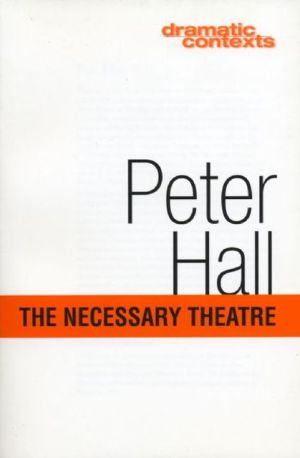

 |

|

The average rating for Necessary Theatre based on 2 reviews is 3.5 stars.
Review # 1 was written on 2019-04-14 00:00:00 Dennis Skelton Dennis Skeltonp.9 - Increasing pressure form amateur groups, "people's" theatres and influential playwrights had led emperor Alexander III to sign a decree (24 March 1882) abolishing the monopoly of the Imperial theatres in the capitals. The Imperial dramatic theatres, the Maly in Moscow and the Alexandra in St. Petersburg, retained their peculiar subsidized status, as the administration reaffirmed old principles, particularly the emploi system by which actors were assigned a specific "line of business." p.11 - For a while, Chekhov wrote what amounted to a behind-the-scenes gossip column. This activity meant scraping up an acquaintance with actors and managers. Significantly, his first collection of stories is entitled Fairy Tales of Melpomene, and his early works teem with vignettes backstage life, usually presented as caricature or sardonic social commentary. There is nothing idealized in Chekhov's gallery of thespians, who are depicted as vain and petty; but he often found them more attractive than the solid citizentry, with its demands that theatre have a redeeming social purpose. p.29 - Chekhov resolved to give the play [The Seagull] to the Maly, but at the last it was the Alexandra which accepted The Seagull without reservation. The unsuitability of this most subjective of plays should have been patent, however. For years, the Petersburg intelligentsia had refrained from attending the Alexandra. Although it was the State theatre for Russian drama in the administrative capital of the empire, it discounted the classic native repertory in favour of translations and adaptations, in deference to the Court's disdain for things Russian. Its reputation was as a comedy house, featuring outstanding performers in flimsy vehicles. p.37 - The Moscow Art Theatre had been sounded as an alternative to such theatres as the Alexandra. At an epic luncheon at the Slav Bazaar restaurant on 22 June 1897, the wealthy amateur actor and director Konstantin Alekseev alias Stanislavsky and the prize-winning playwright Vladimir Nemirovich-Danchenko posited a roster of plays with serious artistic r social merit, an ensemble company devoid of starts, and a staging practice that would be sedulous in preparation and execution. Almost from the first, Chekhov was included in their plans. p.111 - Chekhov's lack of popularity immediately before and after the Revolution resulted in part from the belief that he wrote only about gentrified despondency. p.112 - In 1917, by government decree, its [MAT's] audiences were made up exclusively of workers given free tickets at their factories and unions. Such untried playgoers had to be trained in what Stanislavsky considered proper behaviour in a temple of art. Too depleted financially and morally to develop new productions, the Art Theatre had perforce to rely on Chekhov. In its first "Revolutionary" season, its revivals of The Cherry Orchard and Three Sisters made up ten per cent of the repertory. The Art Theatre was out of step in the march towards the monumental. Maksim Gorky was calling for a Communist theatre that in a time of heroic catastrophe had to be epic and romantic. Art was to train the people to feel the "spirit of the struggle." p.113 - The elitist Petrograd journal Theatre and Art (Teatr i iskusstvo), always sceptical of the Muscovites, was unimpressed by the Art Theatre's belated stab at community outreach. It noted that the theatre in general had become so "crude, sluggish, deadly dull" that it was hardly worth devoting space to it. p.116 - The two greatest directors of the Bolshevik era, Vakhtangov and Meyerhold, never staged Chekhov's major plays. p.121 - By October 1920 Lunacharsky, disturbed by increasing factionalism in the arts, issued a policy statement whose guidelines were to remain in force until the dissolution of the Soviet Union. Intended to direct energies towards a common goal, it reiterated that new art had to build on the achievements of the bourgeois past, but they in turn had to be purified of vestiges of decay and depravity. If workers in the arts were sufficiently propagandized, a critical treatment of the classics would insure a high level of revolutionary ideology in production. p.154 - The chief agent on popularizing Chekhov in England was another émigré director, Fedor Komissarzhevsky, better known there as Theodore Komisarjevsky. p.342 - An International Chekhov Festival was held in Moscow in October 1992, featuring three different Cherry Orchards directed by Peter Stein, Andrei Serban and Otomar Krejca. With bloody conflicts flaring up on the fringes of the former Soviet empire, and political unrest at home, the festival's "fest in plaguetime" atmosphere lent a certain hysteria to the opening of Stein's Orchard. |
Review # 2 was written on 2007-12-30 00:00:00 Ashton Williams Ashton WilliamsHellishly boring. How it was accepted for publishing is beyond me. Terrible. Avoid. |
CAN'T FIND WHAT YOU'RE LOOKING FOR? CLICK HERE!!!